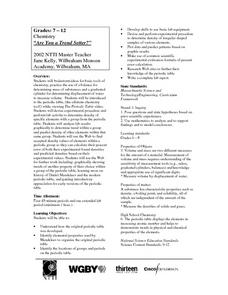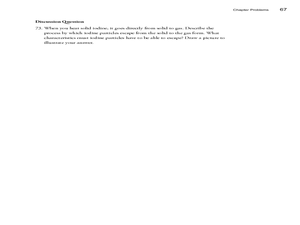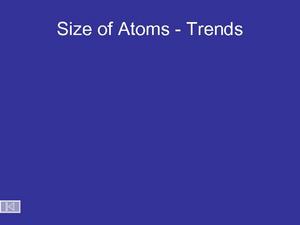National Institute of Open Schooling
d-Block and f-Block Elements
Potassium permanganate, containing manganese one of the transition elements, has many uses such as mouthwash and propelling rockets, making it is a very diverse compound. The lesson delves into such transition elements and...
National Institute of Open Schooling
General Characteristics of the p-Block Elements
The 20th installment in a series of 36 focuses on the characteristics of the p-block elements. Learners discuss, read about, and answer questions pertaining to the occurrence of these elements in nature, their electron configurations,...
Curated OER
Countdown Challenge
In this countdown challenge worksheet, students find the 10 common elements from the human body, earth's crust, and ancient times and color code them. Students fill the atomic number of the elements in a given periodic table.
Curated OER
A Date With Chemistry
Students research certain elements and then analyze their potential bonds with other elements in a dating game where the dating pool is comprised of the elements featured on the Periodic Table.
Curated OER
Element Research Project
Students research elements on interactive Internet periodic tables, take notes using Inspiration software, and write descriptive paragraphs with graphics. They create presentations.
Curated OER
The Periodic Table
For this periodic table worksheet, students answer 10 questions about the periodic table, the elements in the periodic table, the properties of elements and the atomic number, symbol and name of elements in groups of the periodic table.
Curated OER
Mendeleev's Periodic Table
In this periodic table worksheet, students learn how Mendeleev organized elements by their atomic weight and grouped elements with the same properties. Students compare Mendeleev's periodic table with the modern periodic table. This...
Curated OER
Are You a Trend Setter?
Students are introduced to the periodic table of elements. They devise and perform and experiment in which they determine the density of specific elements. They use their results to predict the density of other elements in the same group.
Curated OER
Elements 'R' Us
Sixth graders participate in a Web Quest in order to examine the periodic table of elements. After collecting information about an element of their choice, they share with group members what they have learned. Groups create class...
Curated OER
Introduction to the Periodic Table
In this periodic table worksheet, high schoolers will label the atomic number, atomic mass, element name, and element symbol for oxygen. Then students will determine the characteristics of the different groups of elements on the periodic...
Curated OER
The Halogens Group 7 of the Periodic Table
In this chemistry worksheet, students select the answers to 32 fill in the blank questions from the word list provided. They identify the physical and chemical characteristics of halogens.
Curated OER
The Periodic Table
In this periodic table worksheet, students complete a crossword puzzle given 19 clues about elements, symbols, properties of elements, atomic number and atomic masses of elements.
Curated OER
Periods and Groups; Valence Electrons; Masses
In this elements learning exercise, students read how the elements are organized in periods and groups in the periodic table. Students use the periodic table to find the valence electrons and calculate molecular mass. This learning...
Curated OER
Changes in Nature
Fifth graders identify the chemical and physical changes in the water cycle, carbon cycle, and the effects of weathering. They analyze the periodic table, and observe how vinegar reacts with limestone in a chemical reaction that causes...
Curated OER
The Structure of Matter and the Chemical Elements
In this chemistry worksheet, students answer 73 fill in the blanks and multiple choice questions on the structure of matter and properties of elements in the periodic table.
Curated OER
The Number of Neutrons
Although the focus of this worksheet is the neutron, you cannot talke about them without also dealing with protons and electrons! Chemistry kids fill in a table of 14 elements, identifying the mass, atomic number, isotopic symbol, and...
Curated OER
Size of Atoms - Trends
This compendious collection of slides leaves no questions when it comes to the concept of atomic size. Thorough and easy-to-read graphs, tables, and graphics explain atomic radii, the shielding effect, the octet rule, isoelectric...
Curated OER
Periodic Trends
High schoolers explore the rationale behind the arrangement of the elements on the Periodic Table. Using internet and traditional research, students compare and contrast the properties of elements on the periodic table to determine a...
Curated OER
Periodic Trends
In this periodic trends instructional activity, students determine the trends of electronegativity in the periodic table. Students compare electronegativity and ionization energy. This instructional activity has 6 problems to solve.
Curated OER
Periodic Poetry
Students review periodic table of elements, choose one element, and create piece of poetry about it using Cinquain, Haiku, or Acrostic format. Students then read aloud their poems to classmates.
Curated OER
Patterns in Electron Configuration
A periodic table of elements and ten accompanying questions comprise this chemistry handout. Learners survey the table to discover the relationship between group columns and valence electrons. They also associate energy levels to the...
Curated OER
Group 14, The Carbon Group
Six slides summarize the details about group 14 in the periodic table, otherwise known as the carbon group. Young chemists will see facts about carbon itself, and then some general uses of related metalloids. This is a short and basic...
Curated OER
Group 7 - The Halogens
Properties and uses of the halogen elements are illuminated by this compact collection of slides. Examples of halogen reactions with alkali metals, hydrogen, and water are also explained. This is a nifty resource to support an...
Curated OER
Periodic Trends
Thorough explanations of the trends in the periodic table of elements make up the majority of this handout. Atomic and ionic size, ionization energy, electron affinity, and electronegativity are presented before giving chemistry...























